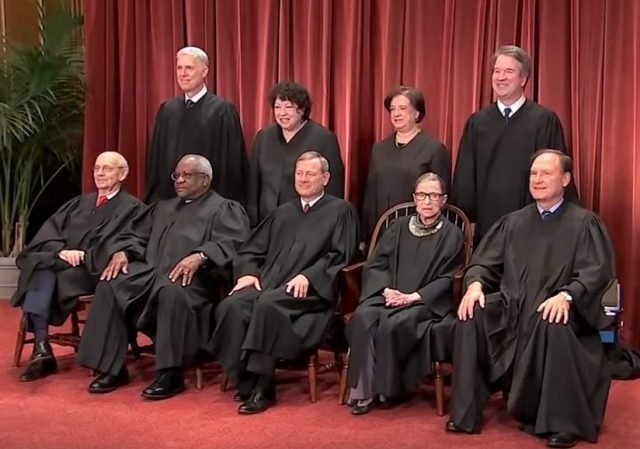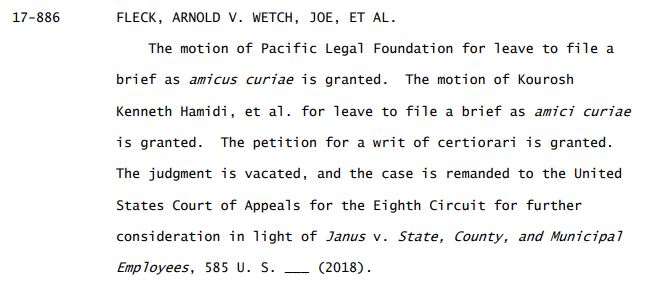Mandatory Bar Association dues for political activity may go the way of similar union dues – away
In Fleck v. Wetch, Supreme Court vacates judgment supporting mandatory dues and remands for consideration in light of Janus union dues decision.

In Fleck v. Wetsh, review by the Supreme Court was sought of an 8th Circuit decision denying a challenge to North Dakota’s mandatory Bar Association dues, some of which went to political activities not directly related to Bar membership.
Note that this has nothing to do with licensing of attorney, as such. Rather, a majority of states require that in addition to registering with the state licensing authority (often the state Supreme Court), bar members also must register with the private Bar Associations. That’s the way it is in Rhode Island, I’m required to pay my annual dues both to the state Supreme Court and separately to the Rhode Island Bar Association.
The problem with this forced membership is that Bar Associations frequently engage in various forms of political activity.
This is a problem which the Supreme Court addressed in the union dues context in Janus v. AFSME. We wrote in June 2018 regarding the Janus ruling:
The Supreme Court handed another victory to free speech with Janus vs. AFSCME (American Federation of State, County, and Municipal Employees). In a 5-4 decision, the justices determined government unions cannot require non-members to pay union dues.
A quick history of the case: Mark Janus worked as a child support specialist for the Illinois Department of Healthcare and Family Services. He was not a member of the union but was required to pay “fair share” dues. The state of Illinois took $50 from his paycheck to cover the cost of the union dues.
Janus argued that these dues “violate his free speech rights because he disagrees with many positions taken by AFSCME and that everything the public employee union does is inherently political.”
Justice Samuel Alito wrote “that this arrangement violates the free speech rights of nonmembers by compelling them to subsidize private speech on matters of substantial public concern.”
The Pacific Legal Foundation describes the importance of the Fleck case as follows:
This case involves compelled association and compelled speech in ways that are similar to Janus v. American Fed’n, 851 F.3d 746 (7th Cir. 2017), cert. granted, 138 S. Ct. 54 (U.S. Sept. 28, 2017) (No. 16- 1466), but different in an important respect. Unlike Janus, this petition addresses both of the legal issues this Court considered in Friedrichs v. California Teachers Ass’n, 136 S. Ct. 1083 (2016):
1. Does it violate the First Amendment for state law to presume that Petitioner consents to subsidizing non-chargeable speech by the group he is compelled to fund (an “opt-out” rule), as opposed to an “opt-in” rule whereby Petitioner must affirmatively consent to subsidizing such speech?
2. Should Keller v. State Bar of Cal., 496 U.S. 1 (1990), and Lathrop v. Donohue, 367 U.S. 820 (1961), be overruled insofar as they permit the state to force Petitioner to join a trade association he opposes as a condition of earning a living in his chosen profession?
The Supreme Court granted review today, but simultaneously issued an Order vacating the lower court judgment and remanding the case for further review in light of Janus:
The petition for a writ of certiorari is granted. The judgment is vacated, and the case is remanded to the United States Court of Appeals for the Eighth Circuit for further consideration in light of Janus v. State, County, and Municipal Employees, 585 U. S. ___ (2018).
The Pacific Legal Foundation describes what comes next:
In Fleck v. Wetch, North Dakota lawyer Arnold Fleck seeks to be free from his forced association with the State Bar Association of North Dakota. After considering his petition for writ of certiorari at eight consecutive conferences, the Supreme Court today granted the petition, vacated the decision below, and remanded for reconsideration in light of Janus v. AFSCME. This is a very important development because Fleck raises issues that were alluded to, but not decided, in Janus, and it does so in the context of a mandatory bar association rather than a public sector union….
The bar association cases and the union subsidization cases are closely bound and frequently cite each other. Janus cannot be distinguished simply because it arose in the union context. Therefore, the Fleck remand requires the Eighth Circuit Court of Appeals to determine how the overall principles enunciated in Janus apply to the concept of exclusive representation as it manifests in the mandatory bar context. Janus did not directly address the non-union employees’ challenge to the exclusive representation statute, which requires the union to bargain on behalf of both members and nonmembers and prevents nonmembers from negotiating the terms and conditions of their employment directly with their employer. The First Amendment principles outlined in Janus, however, demand that no one should be required to forfeit their political autonomy as the price of earning a living, including attorneys.
While the Supreme Court did not rule against mandatory Bar Association dues, by accepting the case and vacating the judgment pending reconsideration, the Supreme Court sent a clear signal that an opt-out structure may not suffice. This would force Bar Associations to get member consent to having a portion of dues spent on political activities, with the reality that many if not most attorney’s will choose not to opt-in and not to pay the extra amount.
The Goldwater Institute, which represents the plaintiff, has all the case documents on its website.
Big victory today for my @GoldwaterInst colleagues (especially @TimothySandefur and my former GI colleague @ManleyLiberty ): the Supreme Court has GRANTED our cert petition in Fleck v. Wetch and remanded in light of the #Janus decision. More on Fleck: https://t.co/s0INg0Mnej
— Christina Sandefur (@cmsandefur) December 3, 2018
 DONATE
DONATE
Donations tax deductible
to the full extent allowed by law.









Comments
I commend the petitioners for their fight to end the practice of having to pay extrotion money to practice their chosen profession. First Ammendment considerations asside unions and associations were hijacked by political operatives to the detrement of their original purpose. Having to pay licensing fees and union dues forces professionals to participate in a government sanctioned blackmail.
Opt-out might not be safe — rumor has long suggested that the Cal Bar Assn looks more closely at those CA attys who claim the Keller deduction from their state bar dues. For the small amount that we can deduct, it is not worth risking additional scrutiny by the Bar!
Long time coming.
Anyone ever read the ABA Magazine anymore? Such paucity of information on anything practical – mostly ‘progressive’ political advocacy. Very sad.
The ABA is a disgrace. Nothing but another branch of the Democratic Party disguised as a nonprofit.
Sanctionable conduct, no?
And more unfortunately, so too the Poisonous Dishonest Media Complex in this Country that is now serving accolades on President Bush who just died in stark contrast to their awful biased reporting when he was LEADING and never recalls the awful press and attempted “Hack Jobs” by fired Journal Thugs like Dan Rathers. Of course their motivation today is because No. 41 had issues with their current target for sedition: President Donald Trump
Well, I resigned from the Oregon State Bar, after having been “inactive” for several years post-retirement, because of its left-wing politics.
Our Bar association actually promoted membership in the ACLU for years.
There is not a more America hating group in this Country than the ACLU. But given their heritage and links to Communism, the only thing that should be considered is why the ACLU is permitted to function in our Country. https://dailycaller.com/2011/01/04/the-aclu’s-untold-stalinist-heritage/
The fastest way to eliminate mandatory dues would be to make mandatory dues for the SCOTUS, to be spent as the majority determines.
That’s three instant ‘NO’ votes right there, and the rest to make it unanimous once the conservatives quit laughing.
Looking at that picture, the wise Latina would make a solid left guard, with the emphasis on the “solid left” part. But since the left’s gonna be playing defense, now that there a 5 good votes (though I’m too happy with Roberts), old Soto will be shifted to left tackle since her (fact & law)-free opinions are too flimsy to move her to middle linebacker.
NOT too happy with Roberts?
That’s probably what he meant. Who is happy with roberts, besides his mother?
Isn’t the ABA tax-exempt? Why are they permitted political activities at all in that case?
They have the Al Sharpton exemption.
Al Sharpton sells his life story – to his own nonprofit – for over a half million:
https://www.foxnews.com/us/al-sharpton-sells-his-life-story-rights-for-531g-to-his-own-charity
George Soros must have that Al Sharpton exemption too. Last we read, he owed We the People about $7 Billion in taxes. I just wonder if he paid that and if not, then why not?